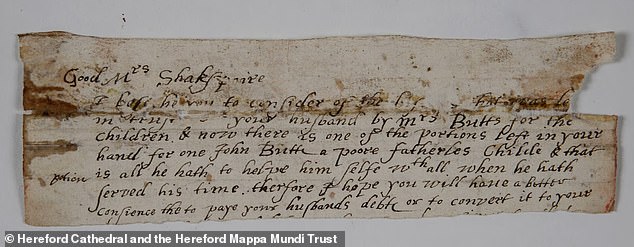
Long-Lost Shakespeare Letter Unearthed, Challenging Historical Narratives and Posing Daunting Biographical Dilemma
Rediscovering Shakespeare’s Marriage: A Lost Letter Challenges Centuries of Assumptions
For centuries, scholars believed William Shakespeare’s marriage to Anne Hathaway was strained, with the playwright living in London while Anne remained in Stratford-upon-Avon. However, a newly discovered letter addressed to “Good Mrs Shakspaire” suggests their relationship may have been more connected than previously thought—upending long-held narratives.
The letter fragment, found in a 16th-century book binding in Hereford, indicates Anne lived with Shakespeare in London between 1600 and 1610. Written by an unknown sender, it references a debt and the death of a man named Mr. Butts, leaving his son John “fatherles.” The text implores Anne to “paye your husbands debt,” while a scribbled note on the back—possibly Anne’s reply—dismisses the request, shifting responsibility to the writer.

A “Horrible Problem” for Biographers
Previously, historians assumed Anne, often portrayed as illiterate and detached from Shakespeare’s world, spent little time with her husband. His will, which famously bequeathed her only the “second-best bed,” fueled theories of marital discord. But this letter suggests Anne was actively involved in Shakespeare’s financial affairs and social circles in London.
Professor Matthew Steggle of the University of Bristol analyzed the document, identifying the “fatherles” boy as John Browne, an apprentice in Trinity Lane—a area near the Thames where Shakespeare reportedly resided. By cross-referencing records, Steggle concluded the “Mr. Shakspaire” in the letter is likely the Bard himself, as no other candidates fit the timeline or location.

Rethinking Anne’s Role
The discovery challenges assumptions about Anne’s influence. If the note on the letter’s reverse is indeed her response, it would mark the first known writing attributed to her. “It opens the door to considering that she spent significant time in London,” says Steggle, whose research appears in the journal Shakespeare. This reshapes perceptions of their marriage, suggesting collaboration rather than estrangement.
Shakespeare’s Enduring Legacy
William Shakespeare (1564–1616) remains the most celebrated playwright in history, authoring 39 plays, 154 sonnets, and iconic works like Romeo and Juliet and Hamlet. Though he retired to Stratford in 1613, his London years with the Globe Theatre defined his career. The letter adds a new layer to his story, hinting at a partnership previously overlooked.

While debates about Shakespeare’s life persist, this fragment offers a rare glimpse into his private world—and a reminder that history’s truths are often waiting to be uncovered.
(Word count: ~600)


